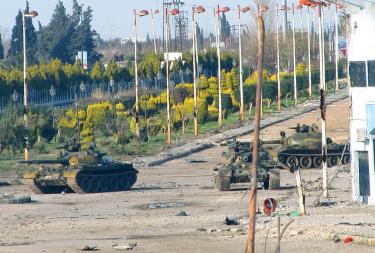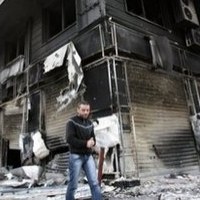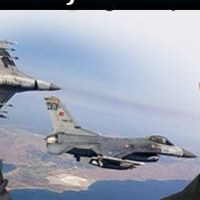![]()
Mon, Feb 13, 2012 | RubinReports | By Barry Rubin

Army tanks are seen stationed at the entrance to the Baba Amr neighborhood in Homs, Syria, on Monday. (Photo: AFP)
There is a strong case that can be made for doing nothing about the Syrian civil war, but a stronger case can be made for doing something relatively low-cost and ineffective, indeed, precisely what the Syrian opposition is requesting.
Forget about major military intervention, which would be dangerous, costly, and above the level of available resources.
I’m also not enthusiastic about a major U.S. effort at regime change, since the Turkish regime wants an Islamist government in Damascus that might even be worse than what exists now. The less the Obama Administration is involved the more likely things are to go better.
Unfortunately, the Obama Administration doesn’t seem able to tell the difference between moderates and anti-American Islamists in Syria. Come to think about it, the Obama Administration isn’t too good at making such a distinction between such people in Egypt, Libya, Tunisia, or Turkey either. Indeed, the U.S. government is taking the Muslim Brotherhood line on Syria.
Russia and China block UN action. The Arab League is talking about an international peacekeeping force but it’s hard to believe either that they would ever accept any non-Arab forces or they would send in their own armies to fight the Syrian military. Most likely this will all amount to nothing. Meanwhile, Syrian documents show that Tehran has provided $1 billion so far to back the regime against the rebels.
And will the Obama Administration shrug its shoulders — so to speak — and do nothing? Yes, quite probably.
There’s also an interesting political dynamic within Syria. I can’t say this with full confidence but there is evidence for the following thesis: The “official” (that is, U.S.-Turkish chosen) opposition leadership doesn’t want armed struggle and indeed seems to prefer a deal with the Assad regime.
Why? Because they feel they aren’t going to win and can make some arrangement with the government that would lead to them coming to power at some time in the future when they have built a stronger political base. The opposition — despite all the Western observers confidently predicting Assad’s imminent fall — know they can’t win without outside help.
The strongest factor in the opposition are what might be called traditional, socially conservative Sunni Muslims. They might swing behind the Islamists; they are far less likely to back liberals. What might best be hoped for if the opposition wins is an Iraqi-style approach in which sectarian tensions and identities are heightened, the priority is put on getting things right at home, and they want to get along with the West without being “pro-Western.”
Now we can understand the debate in the Syrian opposition. The liberals and traditionalists are more likely to back armed struggle, overthrowing Assad, and getting foreign help. The Islamists are more likely to oppose these three goals and want a deal with Assad. Why? Because a deal that let them operate freely, they believe, would eventually lead to them taking over the country.
But to return to the question of what the West or world should do: Listen to the democratic opposition. It wants two things, obviously taken from the Iraqi case: a no-fly zone for Syrian military aircraft and the creation of a safe zone — presumably near the Turkish border — for refugees, fugitives, and the Free Syrian Army.
When I mention the “no-fly” zone to people they ask, “But the Syrian air force isn’t bombing the rebels, right? So what good is this?” The answer is that we’re not talking about fighters or bombers but about helicopter gunships and transport planes. With Syria rushing troops around the country to counter the uprisings, the point is to make it harder for them to do so.
If any plan is going to be considered for intervention this one seems to be the best starting point. Its virtues and shortcomings should be thoroughly discussed so as to decide whether this is a good thing to do. This would be preferable to the current debate that lurches between total passivity and adventurous intervention.
At the same time, the Syria issue shows how the Obama Administration has tied itself up into a hundred knots. For centuries, diplomats of powerful countries have known that you don’t enter into a coalition unless you absolutely cannot avoid it or, even better, you control it. Otherwise, your interests get ground down by those of others.
Multilateralism has its costs. With the Obama Administration leading from behind and stressing the need for a UN consensus to do anything, it is now stuck with a passive stance on the Syrian civil war. On the Iran sanctions issue, it bought off Russian and Chinese opposition by the simple expedient of, in practice, exempting them from observing the sanctions. That won’t work on Syria. Hence, deadlock. America can’t be a great power if the Russians, Chinese, and others (notably Turkey) are able to yank out the power plug any time they want.



 RSS
RSS









What to Do About Syria http://t.co/myw2HjiW
What to Do About Syria http://t.co/myw2HjiW